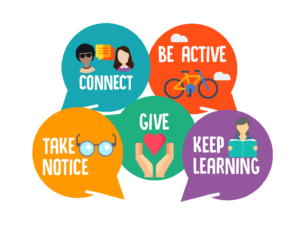Wellbeing
Fun • Creativity • Achievement
Well-Being
Ambition
Our children’s emotional Well-Being is extremely important to us here at Parklands. Our aim is to empower our children the tools that they need to cope with a range of feelings. We want Parklands children to be successful, resilient learners, but it is equally important to us is that they are healthy and content children, both mentally and physically, and are able to approach any challenge with positivity.
How we achieve our ambitions
As part of our Well-Being curriculum, the children take part in Well- Being sessions once a week where every class across the whole school engages in a short session based around mental health and Well-being. These weekly sessions are a part of our PSHE teaching and will cover progressive objectives from our Well-Being curriculum, from exploring feelings and how to cope with them in Reception and Year 1, to acknowledging the effect of our choices on ourselves and others in Year 6.
5 Areas of Well-Being
Within Well-Being, we cover the 5 areas of Well-Being – one each term across 5 terms:
Connect: Feeling close to, and valued by, other people is a fundamental human need and one that contributes to functioning well in the world. Teach children to connect with each other; ask someone how they are. Connect with your feelings. Take a genuine interest in other peoples Well-Being. Connect with local businesses, care homes, nurseries, other settings, secondary schools.
Be Active: Physical health has a direct link to mental health. Regular physical activity is associated with lower rates of depression and anxiety across all age groups. Lower paced activities, like walking, have a positive impact on social skills whilst still exercising. Encourage physical activity: walking, jogging, play a new sport, yoga.
Take Notice: Take note of what is happening around us and how our actions and decisions effect others. Take notice of how you feel. Take notice of all of the emotions: how do they make us feel? Signs of emotions? How to get ourselves back to a calm state. Take notice of the environment and others around you.
Keep Learning: Learn something new (outside of our school curriculum) set yourself a goal and be aspirational. Setting goals has been associated with higher levels of Well-Being. Dedicated time to research / learning something new. A New Learning Challenge E.g: Sign language, knitting etc, a new sport.
Give: Participate in community life, help others and have a positive impact on your community. Link to a charity or environmental projects. Not just raising money; give your time, your understanding, your awareness. How can you give back to community?
In addition to our Well-Being sessions, the children will also attend a Well-Being and relationship assemblies. Mrs Zaman, our Senior Welfare Officer, also provides wellbeing support for our parents. She has offered a number of courses for parents to support them, including a healthy cooking course.
Outcomes
Our aim is that, as a result of our wellbeing curriculum, our children are becoming resilient, well rounded individuals who are able to access their emotions appropriately. They are increasingly having a deeper understanding of what wellbeing is and how to keep healthy, both physically and mentally.
“We are committed to providing the very best teaching and learning experiences, which inspire and challenge pupils to demonstrate exceptional outcomes…”


